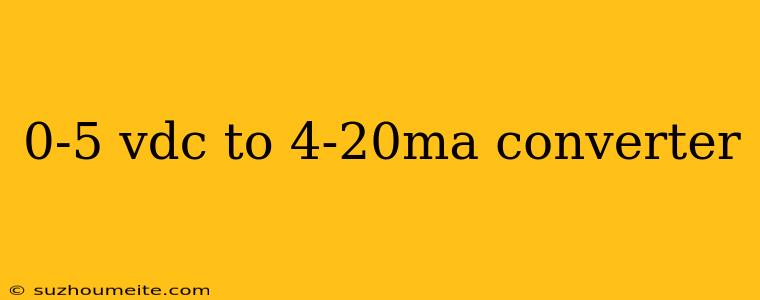0-5 VDC to 4-20mA Converter: A Comprehensive Guide
Introduction
In industrial automation, signal conversion is a crucial process that enables communication between devices with different signal types. One common conversion requirement is from 0-5 VDC to 4-20mA, which is widely used in industrial control systems. In this article, we will discuss the importance of 0-5 VDC to 4-20mA converters, their working principle, types, and applications.
What is a 0-5 VDC to 4-20mA Converter?
A 0-5 VDC to 4-20mA converter is an electronic device that converts a 0-5 VDC voltage signal to a 4-20mA current signal. This conversion is necessary because many industrial devices, such as sensors, transmitters, and controllers, use different signal types to transmit information. The 0-5 VDC signal is commonly used in digital systems, while the 4-20mA signal is widely used in analog systems.
Working Principle
The working principle of a 0-5 VDC to 4-20mA converter is based on the principle of voltage-to-current conversion. The converter takes the 0-5 VDC input signal and regulates the output current to maintain a linear relationship between the input voltage and output current. The output current is proportional to the input voltage, with 0 VDC corresponding to 4mA and 5 VDC corresponding to 20mA.
Types of 0-5 VDC to 4-20mA Converters
There are several types of 0-5 VDC to 4-20mA converters available, including:
Analog Converters
Analog converters use analog circuits to convert the 0-5 VDC signal to a 4-20mA signal. They are simple, low-cost, and widely used in industrial applications.
Digital Converters
Digital converters use microcontrollers or digital signal processing techniques to convert the 0-5 VDC signal to a 4-20mA signal. They offer higher accuracy and flexibility compared to analog converters.
Isolated Converters
Isolated converters use electrical isolation to separate the input and output circuits, providing high isolation voltage and preventing noise interference.
Applications
0-5 VDC to 4-20mA converters have a wide range of applications in industrial automation, including:
Industrial Control Systems
Industrial control systems use 0-5 VDC to 4-20mA converters to interface with sensors, transmitters, and controllers.
Process Control
Process control systems use 0-5 VDC to 4-20mA converters to monitor and control process variables such as pressure, temperature, and flow rate.
Instrumentation
Instrumentation systems use 0-5 VDC to 4-20mA converters to interface with transmitters, sensors, and other instruments.
Conclusion
In conclusion, 0-5 VDC to 4-20mA converters are essential devices in industrial automation, enabling communication between devices with different signal types. Understanding the working principle, types, and applications of these converters is crucial for designing and implementing effective industrial control systems.
